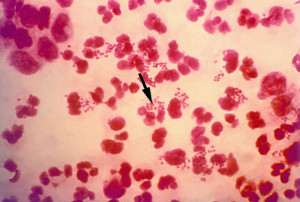 Gonorrhea
Gonorrhea
Gonorrhea is a sexually transmitted disease (STD) that is caused by the bacteria Neisseria gonorrhoeae.
Over time, gonorrhea bacteria have developed a resistance to antibiotics such as sulfonilamides, penicillin, tetracycline and ciprofloxacin, which are commonly prescribed to treat gonorrhea infections.
Recently, the CDC stopped recommending the use of an antibiotic called cefixime to treat gonorrhea, because the drug was losing its effectiveness. Now, they recommend treating infections with a drug called ceftriaxone, along with either azithromycin or doxycycline, as the best way to reduce the risk of the bacteria becoming even more drug-resistant.
In 2010, a total of 309,341 cases of gonorrhea were reported in the U.S. — a rate of about one case per 1,000 people, according to the CDC.

